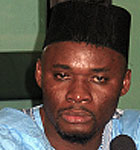
The International Criminal Tribunal for Rwanda was an international court established in November 1994 by the United Nations Security Council in Resolution 955 in order to judge people responsible for the Rwandan genocide and other serious violations of international law in Rwanda, or by Rwandan citizens in nearby states, between 1 January and 31 December 1994. The court eventually convicted 61 individuals and acquitted 14.
Protais Zigiranyirazo commonly known as Monsieur Zed, is a Rwandan businessman and politician and was governor of the Ruhengeri prefecture in northwestern Rwanda from 1974 to 1989. Zigiranyirazo was a member of the Akazu, an elite circle of relatives and friends of former President Juvénal Habyarimana who pushed the Hutu Power ideology.
Jean-Paul Akayesu is a former teacher, school inspector, and Republican Democratic Movement (MDR) politician from Rwanda, convicted of genocide for his role in inciting the Rwandan genocide.

Hassan Ngeze is a Rwandan journalist and convicted war criminal best known for spreading anti-Tutsi propaganda and Hutu superiority through his newspaper, Kangura, which he founded in 1990. Ngeze was a founding member and leadership figure in the Coalition for the Defence of the Republic (CDR), a Rwandan Hutu Power political party that is known for helping to incite the genocide.
Félicien Kabuga is a génocidaire and Rwandan businessman who played a major role in the run-up to the Genocide of the Rwandan Tutsis. A multimillionaire, he was closely connected to dictator Juvénal Habyarimana's Hutu nationalist MRND party and the Akazu, an informal group of Hutu extremists who helped lead the Rwandan genocide.
Jean-Baptiste Gatete is a Rwandan politician, convicted of conspiracy to commit genocide, genocide and extermination in the 1994 Rwandan genocide.
Tharcisse Renzaho is a Rwandan soldier, former politician and war criminal. He is best known for his role in the 1994 genocide against the Tutsi.
Ildéphonse Nizeyimana is a Rwandan soldier, who was convicted of having participated in the Rwandan genocide by the International Criminal Tribunal for Rwanda.
Callixte Nzabonimana is a former Rwandan politician who is accused of participating in the Rwandan genocide.
Augustin Ndindiliyimana is a former Rwandan General and Chief of the Rwandan National Gendarmerie. He was convicted of genocide by the International Criminal Tribunal for Rwanda but he was acquitted by the tribunal upon appeal.
François-Xavier Nzuwonemeye is a former Rwandan soldier, who is chiefly known for his role in the Rwandan genocide.
Ferdinand Nahimana is a Rwandan historian, who was convicted of incitement to genocide for his role in the Rwandan genocide.
Major Bernard Ntuyahaga is a Rwandan army officer convicted by a Belgian court for the murders of ten United Nations peacekeepers at the start of the Rwandan Genocide

Joint criminal enterprise (JCE) is a legal doctrine used during war crimes tribunals to allow the prosecution of members of a group for the actions of the group. This doctrine considers each member of an organized group individually responsible for crimes committed by group within the common plan or purpose. It arose through the application of the idea of common purpose and has been applied by the International Criminal Tribunal for the former Yugoslavia to prosecute political and military leaders for mass war crimes, including genocide, committed during the Yugoslav Wars 1991–1999.

Grégoire Ndahimana is the former mayor of Kivumu, Rwanda. Indicted and arrested for alleged war crimes by the International Criminal Tribunal for Rwanda (ICTR), Ndahimana is thought to be one of the key figures in the 1994 Rwandan genocide, and is claimed to have had up to 6,000 Tutsi killed. In 2013, he was convicted of genocide and crimes against humanity and sentenced to 25 years in prison.
Callixte Mbarushimana is a Hutu Rwandan and former United Nations employee (1992–2001) who is alleged to have participated in the Rwandan genocide of 1994. On 28 September 2010, Mbarushimana was indicted by the International Criminal Court (ICC) in The Hague for crimes against humanity and war crimes allegedly committed in the Democratic Republic of the Congo in 2009. He was arrested in France in October 2010 and extradited to the ICC on 25 January 2011. However, he was released on 23 December 2011 as the ICC found there was insufficient evidence for prosecuting him.
Drew White (QC) is an international lawyer from Canada best known for his role in the conviction of Colonel Theoneste Bagosora, who the media dubbed "the mastermind" of the 1994 Rwanda genocide and who White referred to in his closing trial submissions as one of the "enemies of the human race".

Eliézer Niyitegeka was a journalist, former politician, and high level participant in the 1994 Rwandan genocide. After studying journalism in Romania, Niyitegeka became first a journalist and presenter with Radio Rwanda and subsequently a Member of Parliament, then executive in a textile company and businessman. In 1991, with the coming of multi party democracy to Rwanda, he was one of the founding members of the opposition party, the Republican Democratic Movement (MDR). MDR advocated democracy, individual freedoms, the reunion of Rwandans regardless of ethnic considerations, and the end of violence. Its motto, as shown in the party's statute, was: "Liberty, Justice and Work. From 1991 till 1994, he was President of the MDR in Kibuye prefecture. Niyitegeka also held a seat in the national political headquarters of his party.
André Rwamakuba was the Minister of Primary and Secondary Education in the interim government during the Rwandan genocide in 1994. He was born in Nduba, Gikomero commune in Kigali province and is a medical doctor who has studied at Butare University, and in Zaire and Belgium. He was arrested on 21 October 1998 in Namibia and indicted for complicity in genocide and crimes against humanity including extermination and murder. He was acquitted of all charges on 20 September 2006 by the ICTR.
Mugina is a sector and town in Kamonyi District, Southern Province, Rwanda and a suburb of Kigali. The town had a population of 14,755 in the 2012 census, while the sector had a population of 45,894 in the 2022 census.




